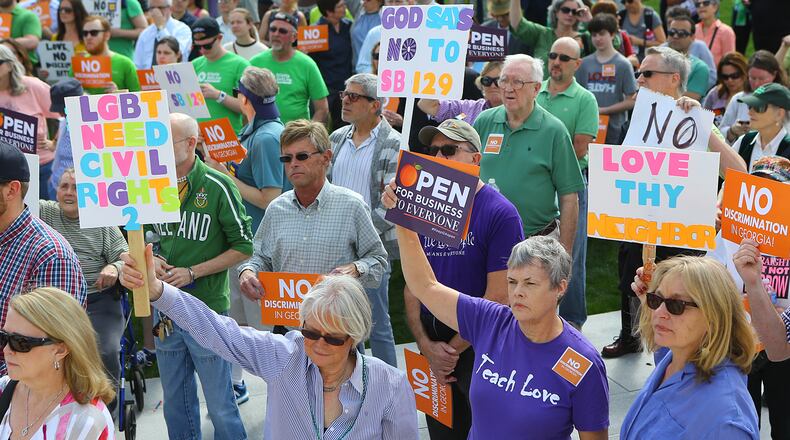Another legislative session has gone by fighting over religious liberty legislation. Again, as last year, Georgians were embroiled in a religious freedom debate as the ire of the nation rained down on other states considering similar measures. In 2014, it was Arizona. This year, it was Indiana. Georgia must not come next.
Recently proposed religious freedom legislation exposes a deep divide in our state, made worse by Georgia’s shockingly thin civil rights law. The lesbian, gay, bisexual and transgender community was one of many communities that forcefully opposed such legislation. It is important to understand why.
Crucial municipal protections have been secured in Georgia localities against LGBT discrimination in housing, employment and public accommodations. And while the public was assured by legislators that religious liberty legislation would not undercut nondiscrimination norms, some supporters openly declared otherwise.
Indeed, some “religious liberty” proponents explicitly stated their intent to use Indiana-style legislation as a vehicle to gut LGBT civil rights protections. Again, promises were made the bill would have no such effect. But LGBT Georgians have little reason to trust a government that has repeatedly subjected them to abuse. Their visceral fears of bias and animus cannot be assuaged by verbal promises legislation, however plain its terms, will not be weaponized to undermine equality.
Senate Bill 129, the Georgia Religious Freedom Restoration Act, would have opened the door to religiously motivated legal challenges to civil rights laws and ordinances. Legislators were implored to recalibrate RFRA to include a civil rights exemption. Language was direly needed to hedge against religious justifications to dismantle anti-discrimination laws. SB 129’s supporters rejected that proposal as an exception swallowing the rule.
We are now at an impasse that only a comprehensive solution will break. The stalling of religious freedom legislation should serve as an opportunity to reexamine our laws and find ways to advance the civil rights of all. Let us commit to a better path.
It is time for statewide civil rights legislation in Georgia.
There are no statutory safeguards for LGBT government employees from discrimination. Legislation to protect state employees has shamefully languished in committees for years. Meanwhile, government-sponsored programs prop up anti-gay policies. Over 100 private schools in Georgia have LGBT student prohibitions subsidized by the state. The state funnels quasi-public scholarship funds to these schools purportedly to improve educational opportunities. But LGBT children need not apply.
This isn’t just about LGBT Georgians. Georgia has no public accommodations law. Georgia joins only four states in its abject failure to protect citizens from invidious treatment in businesses open to the general public. Public accommodations laws are important to ensure equal citizenship. These laws defend protected classes from being targeted with additional transaction costs, prevent businesses from choking off access to goods and services, and guarantee the dignity of citizens in the public square. There is no justification to perpetuate injustices for which 45 other states have crafted a remedy.
This nation settled the question whether private businesses should be subjected to nondiscrimination laws. Maurice Bessinger’s “religious freedom” to deny serving African-American patrons at Piggie Park BBQ in South Carolina found no sympathy. Moreton Rolleston’s “liberty” interest to deny lodging for African-Americans at the Heart of Atlanta Hotel was resoundingly rejected. Lester Maddox’s refusal to integrate the Pickrick Cafe by serving Georgia Tech students was not the death knell of property rights or American free enterprise as he claimed.
For over 50 years, this country has firmly held that for-profit entities cannot discriminate against protected classes in ordinary commercial transactions. A Georgia civil rights law to affirmatively ban this kind of discrimination has been far too long in the coming.
It is legal in Georgia to deny LGBT people housing or employment even though a large majority of Georgians favor banning these discriminatory practices. But Georgia’s employment laws fail more than just LGBT Georgians. It remains legal under Georgia law to deny employment on the basis of race, color, religion, sex or national origin. We join only Alabama and Mississippi in failing to meet this basic obligation of government. That is not a distinction we should keep.
In the calm after the storm, we must be vigilant to forge robust protections for all. We can no longer delay because, as civil rights history shows us, “wait” often means “never.” Now is the time to finally make good on the promise of equal citizenship that Georgia has never fully embraced. Let us, together, make the Empire State of the South a shining example for all.
Anthony Michael Kreis teaches in the School of Public and International Affairs at the University of Georgia.
About the Author
Featured

